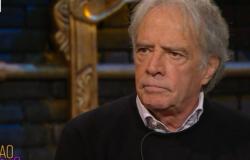Stanley Kubrick (1928-1999), the relentless perfectionist who directed some of cinema’s greatest classics, was so sensitive to criticism that, in 1970, he threatened legal action to block the publication of a book that dared to discuss the flaws of his films. The director of Spartacus And 2001: A Space Odyssey he warned the book’s author and publisher that he would fight “tooth and nail” and “use every legal means at his disposal” to prevent its publication. And so it was. Now, 25 years after his death, the book that Kubrick didn’t want anyone to read is being published, more than half a century late. The Magic Eye: The Cinema of Stanley Kubrick Of Neil Hornick will be published on April 30 by the American publisher Sticking Place Books, with three prefaces that reflect the subject’s ruthlessness in trying to block publication and control his image.
Kubrick’s debut: the world premiere restoration in Bologna. Relive ‘Fear and Desire’ in its entirety
by Chiara Ugolini
June 24, 2023
Hornick, now 84 from London, said Kubrick’s legal threats were a shock: “I consider it a painful episode.” He had been commissioned the first book on Kubrick by The Tantivy Press more than 50 years ago. Kubrick was initially helpful, sharing copies of his films that were otherwise inaccessible. But after seeing a draft of the book, the director changed his mind and blocked its publication. The filmmaker complained that the book contained “a summary of the good things about each film followed by a summary of the bad things, which, in Kubrick’s opinion, always outweigh the good things because of the overly emphatic way in which such criticisms are presented “. The Tantivy Press had signed an agreement with Kubrick stating that the publishing house would not publish anything “until the entire contents have been approved in writing by me (Kubrick)”.
Hornick now explains: “I understood that his legal agreement with the publisher entitled him to ensure that the book was factually correct. I did not expect the entire book to be rejected.” Kubrick’s lawyers were clear: “Should any attempt be made by you or any other publisher to publish the existing manuscript without your approval, our client will have no alternative but to accept our advice to take all actions within his provision to prevent such publication and to request compensation for the damages suffered”. Kubrick estimated that “unacceptable” criticism amounted to a third of the 70,000-word manuscript. But he never specified what had caused the offense, and Hornick was baffled because he believed the criticism was not that widespread. They appeared mainly in a chapter on Lolita, a 1962 adaptation of Vladimir Nabokov’s controversial novel about a man who becomes obsessed with a 12-year-old girl. In the book Hornick writes: “There are good things in Lolita. But in too many ways it wastes, impoverishes and conventionalizes the source material, emptying it of its complexity, nymphetism and eroticism.” Hornick comments: “I found the film version largely a pointless betrayal of the original novel from which it was adapted. However, I expressed great admiration for most of his other films. ” The book describes him 2001 as “a masterly achievement” and Kubrick’s 1957 film about the First World War Horizons of glory as “a film of intoxicating visual sophistication”. Kubrick never responded to Neil Hornick’s offer to revise substantial sections, “provided the critical integrity of the book was not jeopardized,” as the author had written to him. Instead, the director collaborated closely with his friend, film critic Alexander Walker, on a book titled “Stanley Kubrick Directs,” published in 1972.






